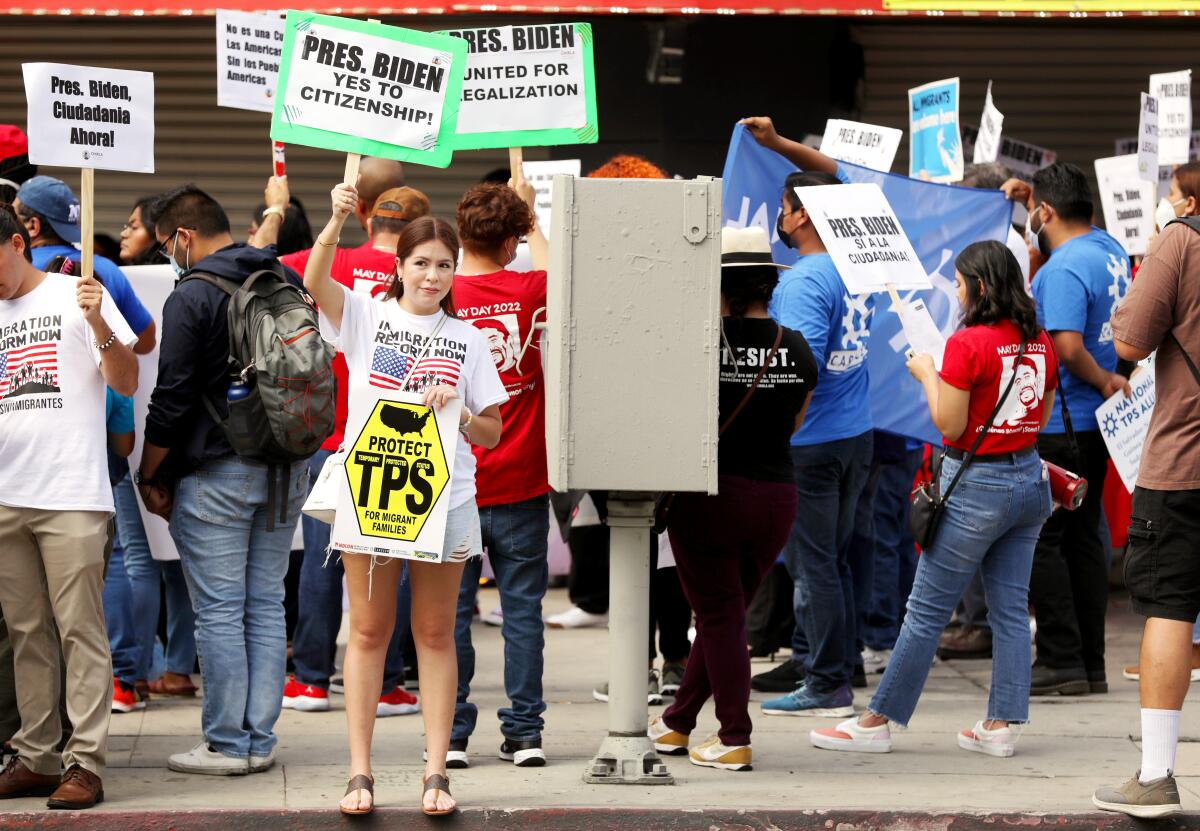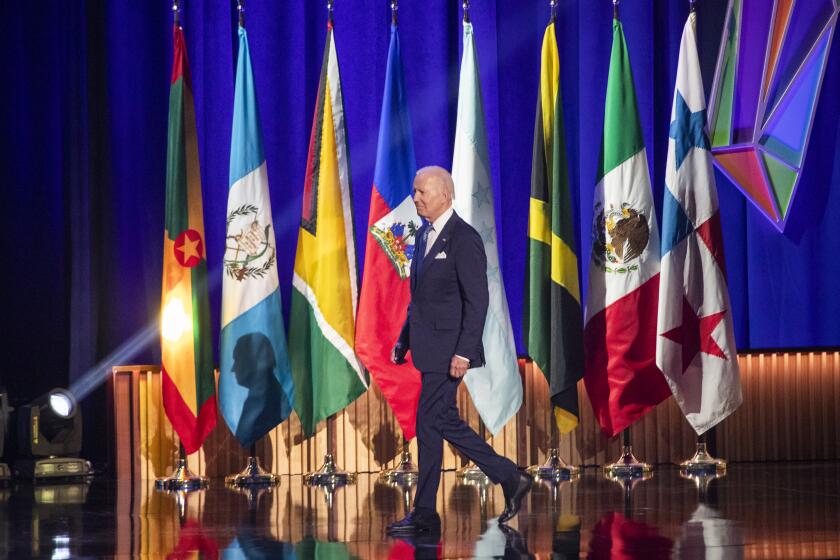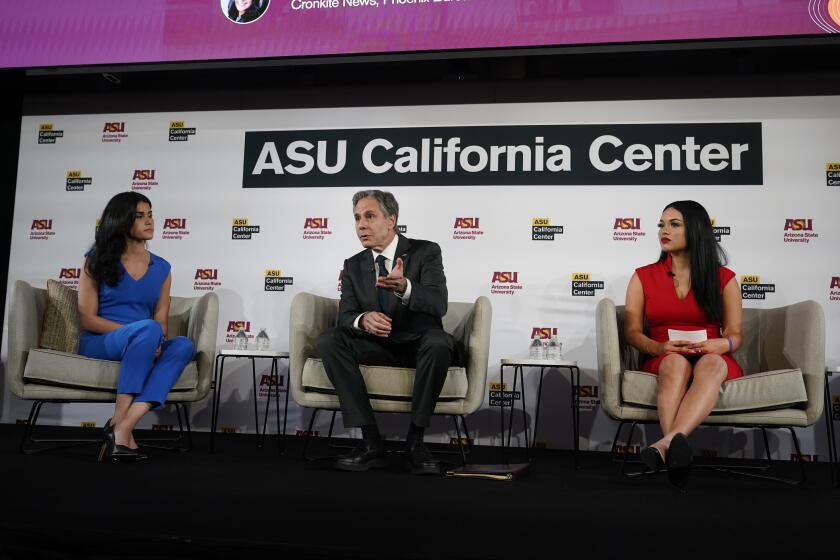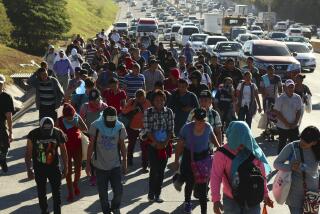News Analysis: Migration looms over summit despite White House reluctance to highlight the issue

- Share via
As planning got underway for this week’s Summit of the Americas — the first to be held in the U.S. in nearly three decades — the Biden administration circulated an agenda identifying its major themes: improving healthcare, addressing climate change, enhancing democracy and expanding access to technology.
Members of civil society and advocates planning to participate in the summit in Los Angeles noticed a glaring omission for a hemisphere mired in crisis: migration.
The politically fraught and regionally complex issue, which has vexed the U.S. and Latin America since the summit was first created, has loomed large over this week’s conference. Though the summit has been dogged by regional rifts over who was invited, advocates and some involved with the planning say a reluctance to spotlight migration has undermined U.S. leadership on the issue. It also has limited the chances the Biden administration can build a coalition to address the problem, they said.
“To not put a focus on [migration] and then to not spotlight it and actually responsibly take this opportunity to engage the leaders on what is forcing people out of their countries is a squandered opportunity,” said Angelica Salas, executive director of Coalition for Humane Immigrant Rights. “It is not elevated to the level that the reality requires.”
The result, she said, is that migration has become “the elephant in the room.”
The U.S. left addressing the migration issue until Friday, the last day of the five-day conference. That’s when President Biden plans to sign a joint declaration committing more countries to share the burden of hosting migrants by creating more visa pathways to move legally or to allow migrants to obtain humanitarian protections. It is not at all clear, however, which nations will sign on to the agreement.
The leaders of several countries critical to addressing the issue skipped the summit in protest over the Biden administration’s decision to exclude leaders of several countries it considers to be antidemocratic. Mexico’s President Andrés Manuel López Obrador, who led the objections over the guest list and is perhaps the most important U.S. partner in the region, stayed home, sending his foreign minister, Marcelo Ebrard, instead.
Leaders of El Salvador, Guatemala and Honduras also decided not to attend. Mexico and those three countries produce most of the migrants seeking to cross the U.S. border.
The boycott has led some to wonder whether the declaration will be purely symbolic, though White House officials have expressed confidence that several countries will step forward, including Mexico. U.S. officials said addressing migration at the end of the conference is giving them time to convince countries to back the agreement. They also pointed out that Biden discussed the issue in his major summit speech, telling attendees that “safe and orderly migration is good for all of our economies, including the United States.” But he added, “unlawful migration is not acceptable.”
President Biden formally opens the Summit of the Americas in Los Angeles on Wednesday with an economic pitch, amid tensions over the guest list.
Even so, some advocates expressed frustration that relegating migration to the last day has only made it harder to come to an agreement by highlighting seeming U.S. reluctance to seriously tackle the problem.
“I think it was a missed opportunity not to have had more civil society dialogue and feedback about things that the government should be considering and prioritizing as they look at protection issues,” said Maureen Meyer, vice president for programs for the Washington Office on Latin America.
Economic devastation, environmental disaster, corruption and political instability have upended migration patterns across the region. Crisis in Venezuela has disproportionately catapulted millions of migrants across countries including Chile, Colombia and Peru.
Physical and political earthquakes in Haiti have moved migrants to South America while northern Central Americans are crossing Mexico into the U.S. at a historic pace. Nicaraguans have fled to Costa Rica to escape their country’s dictatorship.
“Migration is a challenging issue for a lot of reasons, for a lot of these countries, and they have been dealing with it in different ways,” said Theresa Brown, a former Department of Homeland Security official who now serves as managing director of immigration and cross-border policy at the Bipartisan Policy Center.
“I think there are some things that can be done together, if there’s will. But a lot of these leaders haven’t met together before ... that may have been part of the challenge.”
Activists, dissidents and artists from countries not invited to the Summit of the Americas have made their way to Los Angeles for the event this week.
The Biden administration has run into difficulty in in trying to convince some countries to aggressively address migration for a host of reasons mostly having to do with conflicting political objectives, according to Gaspar Rivera Salgado, project director at the UCLA Labor Center.
“It would force countries that are the sources of these diverse flows of migration to recognize that their domestic policies around security, around economic opportunity are not working,” he said. “It would also force countries that are receiving these migrants such as the United States and Mexico, Costa Rica and Chile, to recognize the problem as a humanitarian crisis. That would mean they have a moral obligation to provide aid instead of turning to deterrence.”
“It illustrates the failed promises and the limits of multilateralism because multilateralism only goes as far as nationalism.”
In the U.S., the Biden administration has been confronted by the tough politics of immigration. Republicans have seized on the issue to paint Biden as weak on border security ahead of November’s midterm elections. And he’s frustrated progressive supporters who argue he’s been slow to enact the immigration reform he campaigned on and remove border restrictions, including a pandemic-era health order that gave authorities the power to expel migrants without a legal process. (A federal judge blocked the administration from lifting the order, known as Title 42, in May.)
Analysts say the unrelenting criticism and political toxicity of immigration appears to have led to hesitancy among some in White House to place an emphasis on migration at this year’s summit.
“For the U.S. summit hosts, the ugly domestic politics of immigration undermine U.S. leadership on the issue,” said Benjamin Gedan, acting director of the Wilson Center’s Latin American Program.
The keynote pieces of the summit start Wednesday with President Biden’s arrival, along with the presence of about 20 of the region’s leaders.
Vice President Kamala Harris, for example, has faced serious domestic resistance for a lack of progress on her most high-profile assignment — leading the administration’s efforts to address the so-called root causes of migration from Honduras, Guatemala and El Salvador. Republicans have hammered her over the lack of progress in stemming the influx of migrants, and immigration advocates have expressed concerns that she seems ambivalent about the issue.
Administration officials countered that Harris is taking the matter seriously. Earlier this week, she announced nearly $2 billion in new private investment in El Salvador, Honduras and Guatemala, bringing the total in corporate pledges for investment in the region to $3.2 billion since she began the initiative last year. She also launched a women’s empowerment program to train young women and girls with job skills and a $50-million “Central America Service Corps” to provide paid community service jobs to young people.
However, when the administration formally kicked off the summit on Wednesday, the vice president did not even mention migration in her opening remarks, despite rattling off a list of other problems facing the region that include the “climate crisis, food insecurity, economic inequality, corruption, and gender-based violence.”
More to Read
Sign up for Essential California
The most important California stories and recommendations in your inbox every morning.
You may occasionally receive promotional content from the Los Angeles Times.














